Fantasy Sports App Development [Alternative-spaces’s Guide]

This blog is intended for entrepreneurs that wish to capitalize on the desire of millions of sports aficionados, video gamers, viewers of reality TV shows, and other fans for more content, excitement, strategy, peer competition, and gambling. Read on to find out the basic steps to fantasy gaming app development, key features of the apps, the possible cost, and other insights and tips based on Alternative-spaces’s experience.
Table of contents
- Types of Fantasy Games
- Essential Features of a Fantasy Gaming Website or Mobile App
- Six Steps to Fantasy Sports App Development
- Alternative-spaces’s Experience in Fantasy Gaming App Development
- The Cost of Fantasy Sports App Development
- FAQ
The fantasy sports market’s revenue is expected to reach 32 billion USD in 2025, growing at a CAGR of 12.67% during 2020-2025. Some of the factors of this growth include a large millennial population with high disposable income for entertainment, growing affiliation with sports, increased media digitization, significant investments in high-speed internet infrastructure, rapid smartphone penetration, and simplified digital payments.
The industry’s rapid growth and other benefits attract established companies and start-ups to invest in fantasy sports software development. Adding fantasy sports to a gaming portal will diversify a company’s portfolio, attract more users, increase traffic, and increase revenue. If you contemplate the opportunity, you have landed on the right page.
This blog largely refers to fantasy sports app development because it’s the original and most common type of fantasy gaming. However, the outlined software development processes and tips will apply to any kind of fantasy game. Let’s start with some examples.
Types of Fantasy Games
Sports-based fantasy games
Fantasy sports are a mix of sports team management and betting office. A game starts with selecting a contest and assembling a virtual “dream team” of players. Often, gamers can recruit, drop, and trade players on a limited virtual budget, like real team managers do. Gamers can play a season-long fantasy or draft a new roster every day.
They win points based on the selected players’ performance during actual games. For instance, if you listed Cristiano Ronaldo on your fantasy team and he scored two goals and got a yellow card in a UEFA Champions League match, you will gain 250 points for the goals and lose 20 for the card. A match’s outcome doesn’t matter, only the performance of individual players who may even play against each other in a particular match. Gamers can keep track of their players and their virtual team’s position in real time.
Most platforms offer free and paid contests. A bulk of the contest entry amount (CEA) from paid contests makes up the prize pool, and 10-20% goes towards the fantasy sports platform fee.
Depending on the contest type, gamers are ranked based on the performance of their virtual teams during a match, tournament, or season. For example, a fantasy football contest coincides with an actual NFL season.
The US market size of fantasy sports reached 8.88 billion USD in 2021 and is expected to grow further due to the perpetually increasing user base and immense popularity of football, basketball, and baseball.
DraftKings, FanDuel, and Yahoo Fantasy Sports are some of the most popular fantasy sports platforms in the US.
For example, the daily fantasy sports of DraftKings, with 1.5 million monthly paying customers, include NFL football, MLB baseball, NBA basketball, NASCAR, PGA golf, and MMA. The platform has awarded over 10 billion USD in prizes to date.
India is arguably the fastest-growing fantasy sports market, with 200+ fantasy sports operators and a user base of 130 million expected to expand at a CAGR of 32% in the coming years. The country’s market is projected to grow from 346 billion INR in 2021 to an estimated 1,650 billion by 2025.
Through partnerships, sporting leagues, sponsorships, and brand ambassadors, fantasy sports operators are becoming an integral part of the global sports industry. One of the biggest benefits of fantasy sports is increased viewership figures. They present a new way to keep people interested and involved in various sports and promote emerging and regional sports leagues and tournaments. A platform may also sell sports-related merchandise and memorabilia.
Fantasy esports apps
Electronic sports often take the form of organized competitions between teams of professional video gamers. In fantasy esports, users draft fantasy teams by picking video gamers participating in such tournaments and earn points based on their IRL performance.
Multiplayer video games like Counter-Strike, Dota, or League of Legends enjoy massive global popularity. As a result, the global esports market was valued at 2 billion USD in 2021 and should grow at a CAGR of 21.9% from 2022 to 2030.
DraftBuff is an example of a fantasy esports application. Users join existing leagues and create new ones, compete with 100K fans worldwide, trash-talk during the games, and win prizes.

Reality TV gaming apps
1/3 of adult Americans watch reality TV shows and competitions like The Voice, American Idol, etc. Most viewers browse for more information, a significant portion stream episodes online, strive to stay socially connected with their idols, and many seek opportunities to play along with the show for rewards.
TV show producers and fantasy gaming app developers can capitalize on this enthusiasm and boost viewership and audience engagement during the shows and between episodes and seasons, increasing sponsorship revenues.
In the case of reality TV, a gamer assembles their fantasy team of a show’s participants. For example, Alternative-spaces’s client Bracketology runs fantasy games based on five reality TV series franchises.
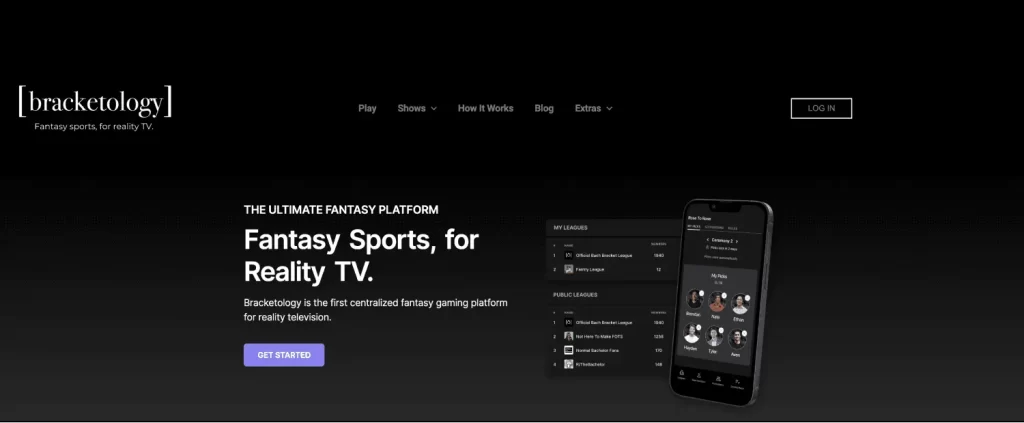
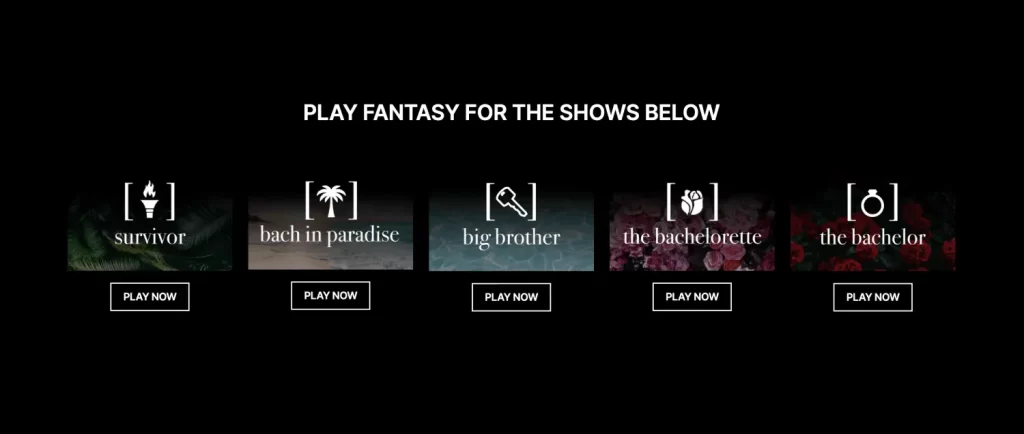
200K+ Bracketology users predict various events for each weekly TV show episode, competing with friends in private leagues or with other fans in larger public leagues. The games are free to play and offer a chance to win prizes from sponsors.
Gamers earn points for each prediction proven correct after an episode is released. The platform’s software scores each episode as it airs, summarizes the players’ results, identifies the leaders in their league, and determines three winners with the highest points at the end of the season. Bracketology is going to implement in-app currency that will be used, among other purposes, as the winners’ prizes.
Fantasy politics gaming apps
Billions of people worldwide follow political events, which offers a tremendous opportunity for fantasy game operators.
For example, in Fantasy Congress, US politics meet fantasy sports website development. Gamers choose real-life members of Congress for their “dream team” and earn points each week throughout a season.
It’s possible to build a political fantasy platform around the Democrats vs. Republicans, the UK’s Conservative and Labour Parties, and other players in the politics of any country where the political competition seems exciting and promising to you.
Fantasy stock market apps
Stock market fantasy games combine the thrill of gaming with the excitement of stock markets. They can encourage otherwise reluctant people to start investing or make financial literacy more effective for novice traders.
The investment portfolio will be a gamer’s “virtual team.” Like in an ordinary investment app, they must select stocks for the portfolio and choose a contest they would like to enter.
The daily fantasy game will last throughout an actual trading day. Once it’s over, the portfolio with the maximum return will win. Since gamers only simulate trading activity, they will not lose money. However, a platform can be set up to accept real money for paid contests with monetary prizes.
Stockz11 is one of India’s first stock fantasy platforms. After choosing or creating a contest, each gamer receives some virtual money to build a portfolio of eleven stocks. Once the contest is live, they can track updates on their portfolio’s performance while stocks are purchased and sold using virtual money. After the contest closes, the app announces the results and awards prizes.
These are only a few examples. Fantasy sports games can be adapted to virtually any type of sports, games, and entertainment. For example, anime or survival drama series viewers might draft teams of favorite characters, earn points after each released episode, and win prizes after a season closes. You may come up with unique game formats or games around activities that nobody else has explored yet.
Whether it’s an otaku-oriented mobile game or traditional fantasy soccer website development, it’s essential to know what features such gaming apps may include.
Essential Features of a Fantasy Gaming Website or Mobile App
1. Gamer functionalities
A quality fantasy sports website or mobile app must offer multiple features enabling an easy onboarding, seamless gaming experience, entertainment, payments, and more. These features may include, but are not limited to:
- User registration and login
- Landing/home page
- Team draft tool
- Player cards
- Contest
- League-related features
- Leaderboard
- Data feeds
- Notifications
- Content
- In-app live chat or forum
- Social media integration
- Live video streaming
- Real-time analytics
- Expert analysis
- User dashboard/profile
- Referral mechanism
- Payment functionalities
- In-app currency
- Customer support
The number and complexity of functionalities and features you may include in your product may depend upon your budget and deadline, the unique requirements of your business and customers, and the app’s domain.
For example, where fantasy soccer app solutions have player cards, a reality TV gaming app will display a participant’s details. A stock market fantasy would feature stock cards with daily, weekly, monthly, quarterly, and yearly performance graphs of a stock, from the last closing price to the current day’s lowest and highest price, maybe with an ability to trade from the stock card.
2. Administrator’s functionalities
An easy-to-adjust administration panel is integral to any fantasy gaming platform: someone must set up the game rules and manage app users, contests, winnings, etc. The admin panel should empower the administrator to manage every aspect of the platforms’ daily operations, marketing, finance, sponsorships, etc., and tweak the app’s functions.
Its key features may include, but are not limited to:
- Dashboard
- User account management
- Contest management
- Player management
- Game management
- Reports
- Customer relationship management
- Ads management
- Merchandise management
- Finance management
3. Fantasy sports app algorithm
Fantasy game point systems can be simple enough to be calculated manually by the admin or a person who manages a league, e.g., points for each rose received in The Bachelor episode.
By contrast, professional sports events require more complex calculations using computers to track multiple parameters, so fantasy sports algorithm software must be connected with providers of high-quality manual and integrated data feeds.
App developers can incorporate commercial fantasy sports algorithm software or develop custom algorithms to manage a platform’s diverse tasks.
To help your fantasy gaming platform stand out from the crowd, you may include extra features and apply unique approaches, for example:
- Artificial intelligence can use available user data to help the website or mobile app offer gamers personalized services and content and send tailored notifications. Deep learning algorithms can help operators predict gamers’ intentions and expectations.
- An integrated chatbot will also improve user engagement and experience by promptly answering users’ questions and providing professional advice, real-time tips, stats significant to teams and players, recent information, and more.
- Blockchain technology can increase the safety of information and processing speed and support another convenient option for gamers to pay or withdraw a winning amount in cryptocurrency. It can help create a decentralized network for monitoring transactions, giving gamers and administrators more control over payment processes.
- You can leverage VR to revolutionize fantasy sports. For instance, your platform can offer virtual environments where gamers from around the world can hang out together, stream live sports events, hold league meetings, discuss strategies drawing on virtual whiteboards, and more.
Six Steps to Fantasy Sports App Development
1. Conduct thorough research and plan the project.
The first thing you need is to formulate your business goals and understand consumers’ needs and the market.
Study the target audience to understand their age, gender, education and income levels, habits, preferences, pain points, etc. This information will help you engage more gamers, clearly formulate your unique selling propositions, etc.
For example, the global fantasy sports user base has been predominantly male, with males contributing to 67% of the total revenue. Still, fantasy games based on franchises like The Bachelor attract primarily female gamers.
Choose the sports, TV shows, or other events your platform will offer. For example, if you target the Indian market, fantasy cricket app development may appear most promising. Cricket accounts for over 85% of the total market value of fantasy sports platforms in the country, generating 250 billion INR in CEA in 2021.
It is beneficial to offer more than one fantasy sport to reach wider audiences and attract users with a variety of choices. For example, in India, cricket, football, kabaddi, and hockey together account for over 98% of the fantasy sports platforms’ total revenue.
Scrutinize industry leaders and your immediate competitors. Explore their business models, offering, features, and app design. This research will help you understand the industry’s best practices and your future competitors’ strengths and weaknesses. If you come up with solutions to the latter while providing the same or better functionalities and quality than your competitors, you may entice their users.
For instance, if you intend to make a fantasy football website, it may help to drive inspiration for the design and responsible play management from FanDuel. If you are focused on cricket, start with Dream11, India’s biggest fantasy cricket platform.
Don’t forget to study the legal situation, regulations, and compliance standards surrounding sports betting in the countries and states in which you plan to operate.
It would be best if your research results in documented product requirements, basic wireframes, and a project plan. If you don’t have the time or skills for research and planning, you can delegate it to a professional agency like Alternative-spaces. Experts can help prioritize the desired app features, suggest the best solutions and technologies, estimate the project budget, identify possible risks, and help organize timely fantasy gaming app development.
2. Prepare a monetization strategy.
Multiple options are available to fantasy sports app developers:
Advertisements
Ads are the top monetization method. Fantasy sports apps display commercials, and AdMob and other ad networks pay them. Few people turn off advertising; 95% of users do not have AdBlock in place or are on their phones while watching their favorite games or TV shows. Ad implementation provides an easy way to start earning, but your website or app needs to build a large user base before it becomes profitable.
Third-party partnering
Fantasy sports apps can generate revenue through partnerships with third-party entities and affiliation with third-party products and services. Brands can have their banners in prominent positions throughout your website and app and can sponsor in-app events like boosters or free player transfers to create a buzz and increase interaction with the audience.
You can also promote brands within your app offering, place affiliate links to products on popular eCommerce platforms and earn commissions, generate content endorsing sports leagues and products, and otherwise monetize the vast filtered audiences’ dedication to a sport, TV show, or video game.
Participation/entrance fees
When platforms charge fees to participants of cash-prize contests, they keep a portion of CEA. With massive paying user bases, the amount can be impressive.
In-app purchases
A fantasy sports app can charge fees for launching a league, league customization, picking a preferred player outside of the standard app-provided list, other personalization opportunities, and even the ability to make adjustments to the entire application as a donor.
Merchandise sales
An online shop with branded merchandise, t-shirts and photos signed by celebrities, etc., will provide an additional source of revenue and increase your fantasy sports platform’s visibility. You can sell virtually anything directly or using in-app currency.
Freemium
Users can download the app for free but later purchase a subscription to access advanced account capabilities, unlock additional features to gain the upper hand over other gamers, or improve their app experience by turning off ads, customizing interfaces, etc.

3. Choose the platform or platforms to launch your application on.
The optimal decision would be to give gamers the freedom to access your platform on their laptops and smartphones right away.
However, if it’s not feasible due to time or budget constraints, you may start small, launching either a website or a mobile application. For example, Dream 11 initially built its user base around its website and later successfully rerouted a significant portion to a mobile app. Still, mobile fantasy sports games are arguably more popular than websites.
Consider factors like your budget, monetization plan, features you plan to offer, and end-users’ preferences and income levels. Professional fantasy gaming app developers also can advise you regarding the optimal approach.
You may also need to choose between two major mobile platforms – iOS and Android – to launch your mobile app first. While the Android OS still holds about 70% of the global market, in the US, more people own iPhones than Android-based phones. iPhone owners have also been traditionally associated with higher income and spending.
One way to get around this dilemma is cross-platform fantasy sports app development. Other options include a hybrid app or progressive web app development.
4. Engage an experienced app development team.
If you are more knowledgeable in the business, sports, and entertainment aspects of the project than in modern Internet technology and software development, you need professionals to help you plan, design, develop, and launch your fantasy gaming application.
Several options are available: to assemble a development team in-house or outsource the job to a software development agency or freelancers.
In any case, the rule of thumb is simple: search for software engineers with relevant experience. If you plan a fantasy stock trading application, search for investment apps on candidates’ portfolios. If you target reality TV fans, look for TV fantasy gaming apps.
Still, if you focus on soccer, for example, it’s not mandatory to hire fantasy soccer app developers only – any fantasy sports app developer can do the job.
If an experienced development team is pricier than less experienced competitors, think of the cost as your investment in success: the team’s expertise will save you from making costly mistakes, speed up the software development, and ensure its high quality. Moreover, you can still save up to 50% of your project budget by outsourcing it to an offshore software developer.
With relevant experience, a flexible development process, and a plethora of experts that can make an excellent dedicated team, Alternative-spaces may prove a perfect solution. Our services can cover every stage of your fantasy sports app development.
5. Design the fantasy gaming app to help and engage users.
The look-and-feel of a fantasy sports app is a major deciding factor. If the audience finds it user-friendly, more attractive than the competitors’, and convenient for hours-long sessions at any time of the day, they’ll prefer it and stick with your platform.
The rule of thumb is: the simpler, the better. There is a distinct design pattern for such websites and apps, and it’s reasonable to follow it. Since the standards of fantasy gaming app development have been established for decades, an interface that differs drastically from similar platforms may confuse or even scare away gamers. A designer experienced in creating user experiences (UX) and user interfaces (UI) for such applications will be an invaluable asset to your project.

At Alternative-spaces, we typically create mock-ups of several main pages and a mood board with examples of different styles and send them to you for approval. If you like the concept, the designer would start developing the UI design applying the selected style and creating a logo, if needed. It usually takes 2-3 iterations for a client to approve a product’s design. After they accept the final version, the development team can proceed with programming the application.
6. Have your web and/or mobile apps built and tested.
We recommend an incremental development approach, starting with a minimum viable product (MVP) with core features that would engage gamers, and further building up the app based on user feedback.
The app’s performance largely depends on the technologies the team chooses.
A fantasy gaming app tech stack may include the following:
Front-end programming languages: CSS, HTML, JavaScript
Back-end programming languages: Java, PHP, Ruby
Frameworks: AngularJS, Bootstrap, jQuery, Vue.JS, Yii2
Database management: MongoDB, MySQL, PostgreSQL, Cassandra, HBase, MailChimp Integrations
Web servers: Apache, Linux
Cloud servers: Amazon Web Service, Azure, Google Cloud
Native mobile app development: Kotlin (Android), Swift (iOS)
Cross-platform app development: Flutter, React.js + React Native
Payments integration: PayPal, Braintree, PayUMoney, Stripe
Push notifications: Twilio, Apple push notifications
Your fantasy sports algorithm software development will require integration with one or several providers of accurate real-time data on sports, politics, or stocks, depending on your specialization.
It is crucial to partner with reputable data feed providers that quickly deliver reliable and consistent match data and trustworthy calculations. Some recommended sports data feed providers include Betradar, Entity Sports, ExeFeed, Fantasydata, GoalServe, LSports, Slotegrator, SportsDataIO, SportsDirect Inc, Sportradar, and Stats Perform.
The apps should be built with scalability in mind. From the onset, your website and mobile apps must be ready to handle high traffic levels. Eventually, they should be able to accommodate user base growth and services diversification with new sports and contest offerings.
Another challenge to fantasy gaming software development is complicated testing, including performance testing.
For example, fantasy football app developers can only test their product during actual football games. Since they occur once or twice a week, the team must wait until the next game day to gauge results and validate improvements.
Alternative-spaces’s Experience in Fantasy Gaming App Development
Bracketology is a recent project realized by Alternative-spaces.
Four fans of The Bachelor envisioned it. The girls had played in their own fantasy Bachelor league for years, sending over their picks via text and keeping score in a Google Sheet. In 2016, they decided it was time to go big, i.e. online, and used personal savings to build the first Bach Bracket website.
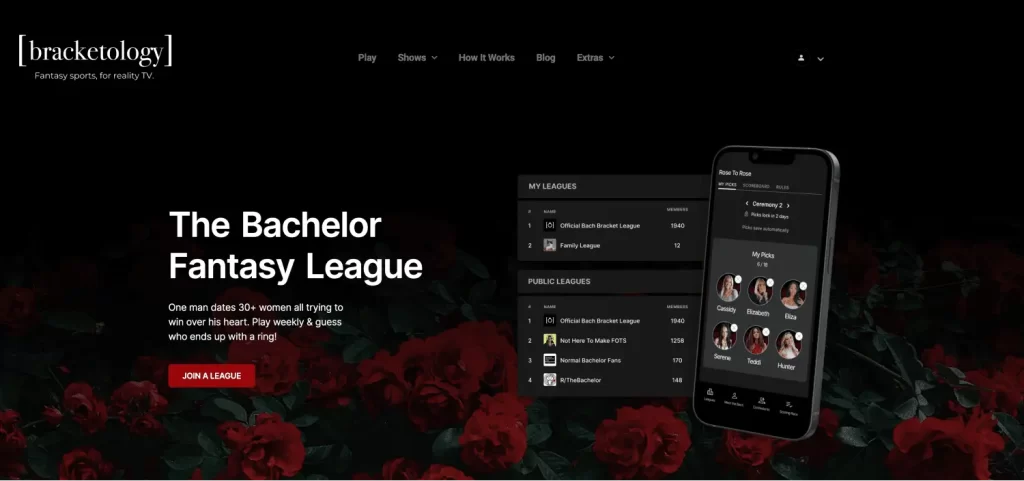
Over six years, it became the biggest fantasy platform for reality TV without spending a penny on marketing. Around 600K users have played its fantasy sports games to date.
In the spring of 2021, its controlling stake was acquired by a group that happened to be connected with Alternative-spaces. Seeing an opportunity to develop the website into something bigger, the new leadership contacted us with a request to support the existing system and create its updated version rebranded as Bracketology.
Over five years, the site’s interface and functionality became outdated. The limitations of the previous technology stack would make any changes, new features, and scaling too complicated and expensive. Another goal was to improve the gamer experience, making the app as streamlined and easy to use as possible.
We selected the following technologies for the fantasy gaming platform development:
Ruby – servers and back-end
Vue.JS – internal part of the web application and front-end
WordPress – landings
Amazon Web Service (AWS) – for hosting and deployment of the project infrastructure
It took the team 7 months to:
- create a brand-new UI/UX design for the web version and adapt it to mobile browsers
- build an updated architecture and develop the front-end and back-end parts of the web application
- prepare and implement the site content
- carry out total testing and normalization of the product before the release
- create a custom admin panel for the platform management
The main problem was that the website is most actively used on the evening of the weekly episode release when the number of users reaches 100K at a time. Initially, the app ran well on Heroku, but as traffic increased, it began to experience problems and limitations. Heroku’s deployment API seemed to fail 1-2 times a week.
The application needed greater capacity and flexibility at a minimal cost. For this purpose, Alternative-spaces’s experts migrated the working application from Heroku to AWS due to the latter’s cost-efficiency, wide geographical coverage, better performance, and convenience.
Alternative-spaces’s DevOps engineer successfully deployed the application in AWS Elastic Beanstalk using Docker. After the migration and load monitoring, Alternative-spaces’s team reduced the capacity of servers and services, cutting the costs from around $800 per month to nearly $450.
Alternative-spaces’s software engineers achieved greater flexibility and productivity in the new Docker and AWS-supported environment. Servers no longer require manual scaling and automatically adjust to load swings on the memory or processor. Hosting bills have also decreased.
Most importantly, the platform retained the ability to support the entire audience of all shows simultaneously. The updated architecture supported rapid and smooth extension to a new show – Survivor – and is ready for adding The Voice fantasy league later in 2022.

Another Alternative-spaces’s project, BSTEVR, included the creation of a unique fantasy football algorithm to empower fans to create matchups between teams and players from any NFL season in history.
Our clients came up with the platform idea after fervent disputes with fellow fans over the “best ever” football team, its particular line-up or players, and “who would beat who” if the titans clashed. The founders envisioned BSTEVR as a way for fans to live out their football fantasies and get impartial and accurate answers regarding their favorite teams’ or players’ supremacy.
For this purpose, they needed a system that would accurately simulate matches between NFL teams and line-ups that would never have met in real life, calculate the points that might be scored, and deliver detailed descriptions of the games’ key points. Users would enter the names into the online simulator configurations, e.g., Dallas Cowboys 2003 vs. Tampa Bay Buccaneers 1992.
Alternative-spaces’s leading developer took a keen interest in the idea, quickly devised a solution, and delivered a demo version of the complex mechanism. After this successful proof of concept, collaboration with two more agencies began.
Alternative-spaces’s team built the key elements of the BSTEVR application:
- the simulator of football games;
- a database that accumulated data and statistics about all the players and games of the NFL since 1966;
- recapper – a system for the automated generation of articles describing the simulated games’ events and results.
Alternative-spaces’s team created an API allowing simulations of games between any teams and players on the database. The system considers dozens of factors to predict a game’s outcome and calculates game ratings based on the amassed historical data on all NFL teams and players.
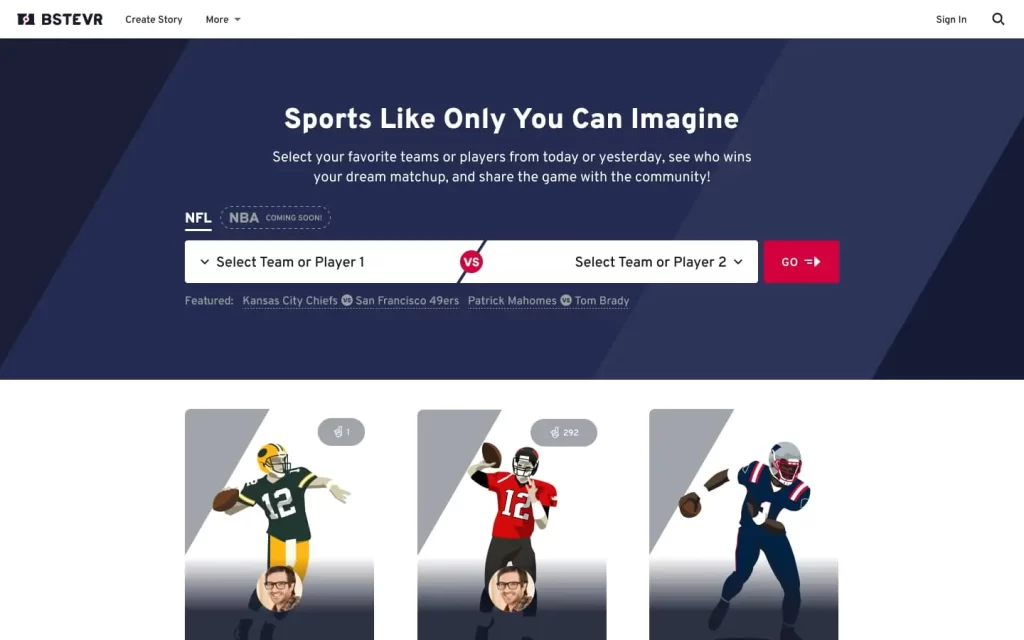
The fantasy football algorithm that we developed converts players’ physical data and activities throughout a season into 20+ ratings used to calculate the results of game simulations. The team verified the ratings by simulating a game in a specific season and comparing its result with the historic game’s outcome. If the predicted and actual winners were the same, we concluded that the algorithm was correct.
Another testing method included comparing the best players according to our calculated ratings with a particular year’s actual best players list. Analytics show that game outcome predictions are highly accurate.
The recapper algorithm created by the Alternative-spaces team can generate articles that read as though a human wrote them. Each article provides detailed information about a simulated match’s highlights and conveys a corresponding emotional experience. The algorithm ensures each article’s uniqueness.
The Cost of Fantasy Sports App Development
The cost depends upon:
- whether it is a website and/or mobile app
- the number and complexity of features
- the selected platforms
- the chosen technology stack
- the development team’s size and skill levels
- the software developers’ rates…
… and other factors. A fantasy sports app’s complexity can impact the cost most significantly, affecting the variables like the app’s design, required technologies, software development and testing methods, and time.
On the other hand, if you choose to outsource any or all of the product development stages:
- product discovery
- proof of concept
- web and/or mobile app design
- web and/or mobile app development
- quality assurance, etc.
…you can reduce the cost of your fantasy sports app development significantly.
For example, at Alternative-spaces’s rate of around $35/hour, an MVP for a fantasy game like Bracketology can cost around $60K-$100K to build. If you want an application with a full set of features listed above, cash prizes, online shop, chat, blog, etc., be prepared to shell out around $200K-$300K.
For a preliminary estimate, please feel free to contact Alternative-spaces’s experts right now.
Alternative-spaces can help you build visually appealing, user-friendly, reliable, scalable, secure, and compliant fantasy gaming web and mobile applications. Our company offers dedicated teams and experts in every technology you need to build and deploy a quality multi-lingual fantasy sports gaming experience.
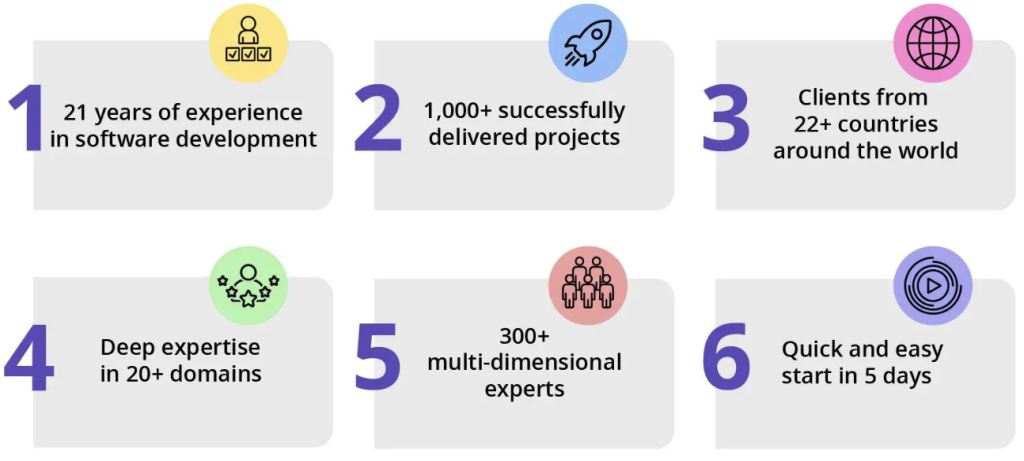
FAQ
How to develop a fantasy sports app from scratch?
The process typically includes:
- research into market trends, competitors, the target audience’s demography, betting legality, etc.
- preparation of a specification, initial design, and app flow, and defining the project scope;
- user experience and user interface design
- development phase, where programmers develop functionalities for gamers and fantasy sports administrators and create an algorithm for fantasy sports apps
- testing, when the QA team ensures the app is effective, secure, glitch-free, and ready to be launched or published on Apple’s App Store or Google Play store.
How much does it cost to build a fantasy gaming app?
The cost of fantasy gaming app development depends upon the number and complexity of features, the development team’s size, skill levels, and location, the number of platforms, and other factors.
A fantasy gaming app’s complexity and the software engineers’ salaries can impact the cost most significantly. For example, outsourcing any or all of the product development stages can cut the cost of your fantasy sports app development by half.
For instance, at Alternative-spaces’s rate of around $35/hour, a minimum viable product for a fantasy game like Bracketology can cost around $60K-$100K to create. If you want a fantasy sports application with a full set of features, cash prizes, online shop, chat, etc., be prepared to shell out around $200K-$300K.
Can I hire fantasy football app developers from Alternative-spaces?
Yes, and more. Alternative-spaces’s experts have experience in programming fantasy sports algorithms, fantasy TV gaming platform design and development, and web and mobile micro‑investment app development, and possess other expertise that may be beneficial for your enterprise, startup, or fantasy sports app development company.
Content created by our partner, Onix-systems.
Source: https://onix-systems.com/blog/fantasy-sports-app-development Home
Home